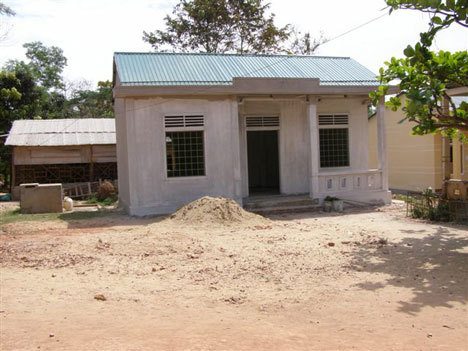More than 40 years later, a local group of peace activists continues to battle the legacy of the Vietnam War.
“It’s ongoing, like war itself,” said Trudy Martin of Langley, president and founder of Friendship Force of Whidbey Island. “We felt we should try to help.”
The group, which participates in exchange visits with other chapters throughout the world in the interest of peace, has spent the past year raising money to build a library in Vietnam.
The library, in Quang Tri Province in the central highlands, one of the hardest-hit areas of the 15-year war, has been completed. Its primary function will be to educate the people of the surrounding area about unexploded bombs and land mines.
Three members of Friendship Force leave today for Vietnam to take part in the dedication of the library and to visit other areas of the country and neighboring Laos. They’ll be gone three weeks.
Making the trip are Steve and Laura Strehlau of Langley and Karen Jeffers of Freeland. Jeffers is the local group’s membership chairman.
“It’s been 40 years, and these poor people are still affected by the war,” Laura Strehlau said. “For the most part, the country has forgiven the United States for its involvement, and has moved on.
“But we haven’t necessarily moved on,” she said of Friendship Force. “We felt we needed to do something.”
The project grew out of a previous visit to Vietnam by a group of Friendship Force members, including Strehlau. They were impressed by the work of Peace Trees Vietnam, based in Seattle, which was digging up unexploded ordinance and replacing it with trees in several areas of the country.
The Whidbey group returned from that trip determined to do something to help. Friendship Force members raised nearly $20,000 for the library, and secured donations of writing materials and other educational supplies.
There was also enough money to pay the salary of a librarian for two years.
The primary function of the library will be to educate the indigenous people of Axing Commune about the dangers of unexploded ordinance, and about the peaceful aspects of the United States.
The library will also serve as a community center.
“These people are poor and just trying to live on what they find,” Martin said. “They dig up what they see, and it blasts them. Every day, somebody gets injured.”
Strehlau praised Peace Trees Vietnam for clearing away mines in the area and for providing a safe location for the library.
“They took a piece of worthless land and made it into something these people can use,” she said.
While at the library, the group will write book labels, plant trees and visit with school children. They will also visit some areas of Vietnam not covered during their previous journey.
And they will also travel to Laos, a neighboring agricultural country hit hard by U.S. planes during the war, even though no war with Laos was ever declared.
Peace Trees is also digging up unexploded bombs and mines in that country, and helping orphans whose parents died from Agent Orange, a toxic defoliant sprayed by U.S. planes on jungle areas during the war.
The war in Vietnam, Laos and Cambodia lasted from 1959 to 1975. The U.S. became involved as part of a containment policy to prevent a communist takeover of South Vietnam by North Vietnam, which eventually occurred anyway.
The war resulted in the deaths of as many as 4 million Vietnamese from both sides, 2 million Laotians and Cambodians and more than 58,000 U.S. military personnel.
And the death toll continues to rise when a Southeast Asian peasant looking for something to salvage to make life better detonates a land mine, Strehlau said.
“We were young when the war was happening,” Strehlau said. “We knew very little about its history. I don’t think we got the picture.”
A visit to the country is “an in-depth eye-opener,” she said. “It’s all too easy to say ‘the people over there.’ When you put a face to them, you realize people around the world want the same things.
“It makes me much more empathetic, and wanting to work toward peace,” she added. “You realize that we’re all the same.”
The 40-member local chapter of Friendship Force is one of more than 350 groups in 50 countries dedicated to promoting peace and cooperation through informal group exchanges.
Founded in 1991, the local group has donated 19 trees for planting near the soccer fields at South Whidbey Sports Complex along Langley Road in honor of visits from other chapters throughout the world.
The club will next host a Friendship Force group from Germany, and another upcoming trip will be to Canada, Martin said.
Since its founding in 1977, with the help of former President Jimmy Carter, Friendship Force International has brought together millions of people. In 2007 alone, 5,763 friendship ambassadors traveled between 58 countries, with thousands more serving as hosts.
Martin said the latest group returning from Vietnam will show slides of the trip at the organization’s next meeting. It will be at 5:30 p.m. Sunday, Oct. 4, at Trinity Lutheran Church in Freeland.



